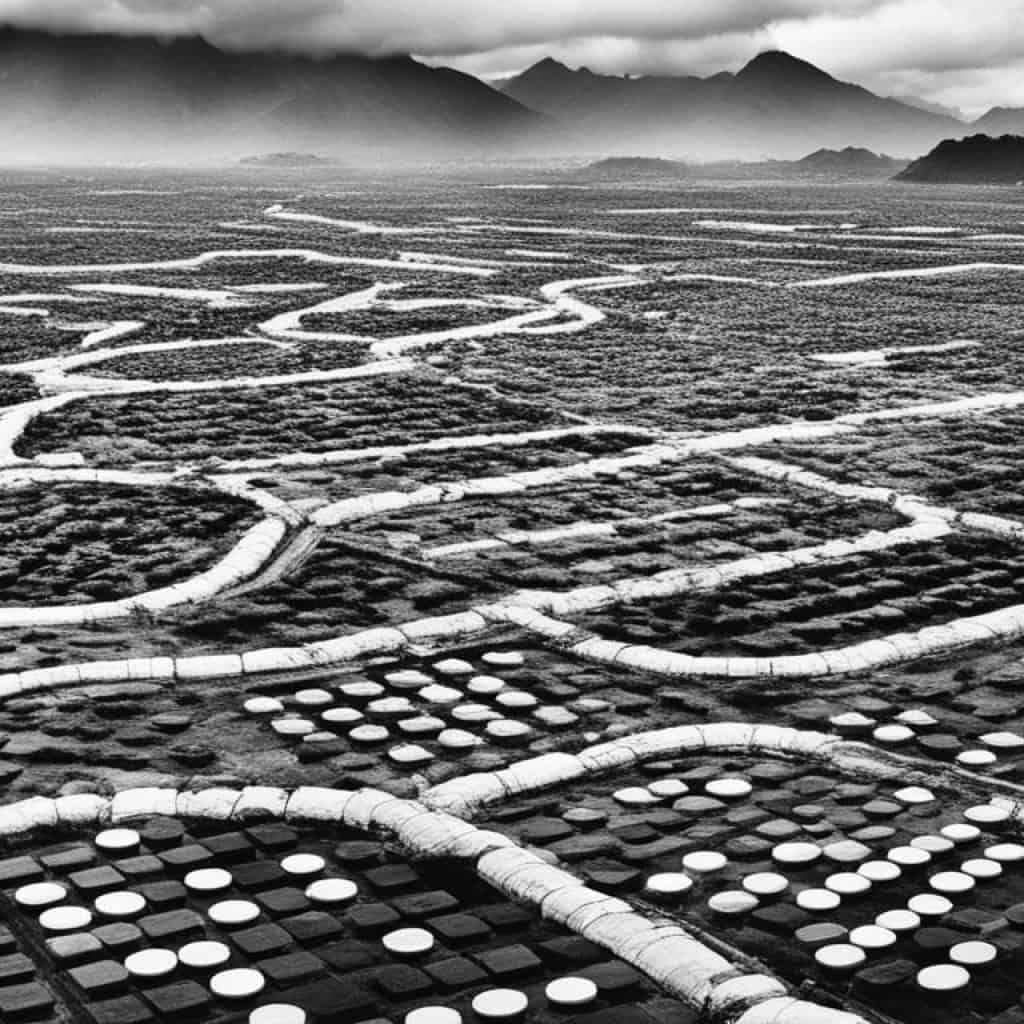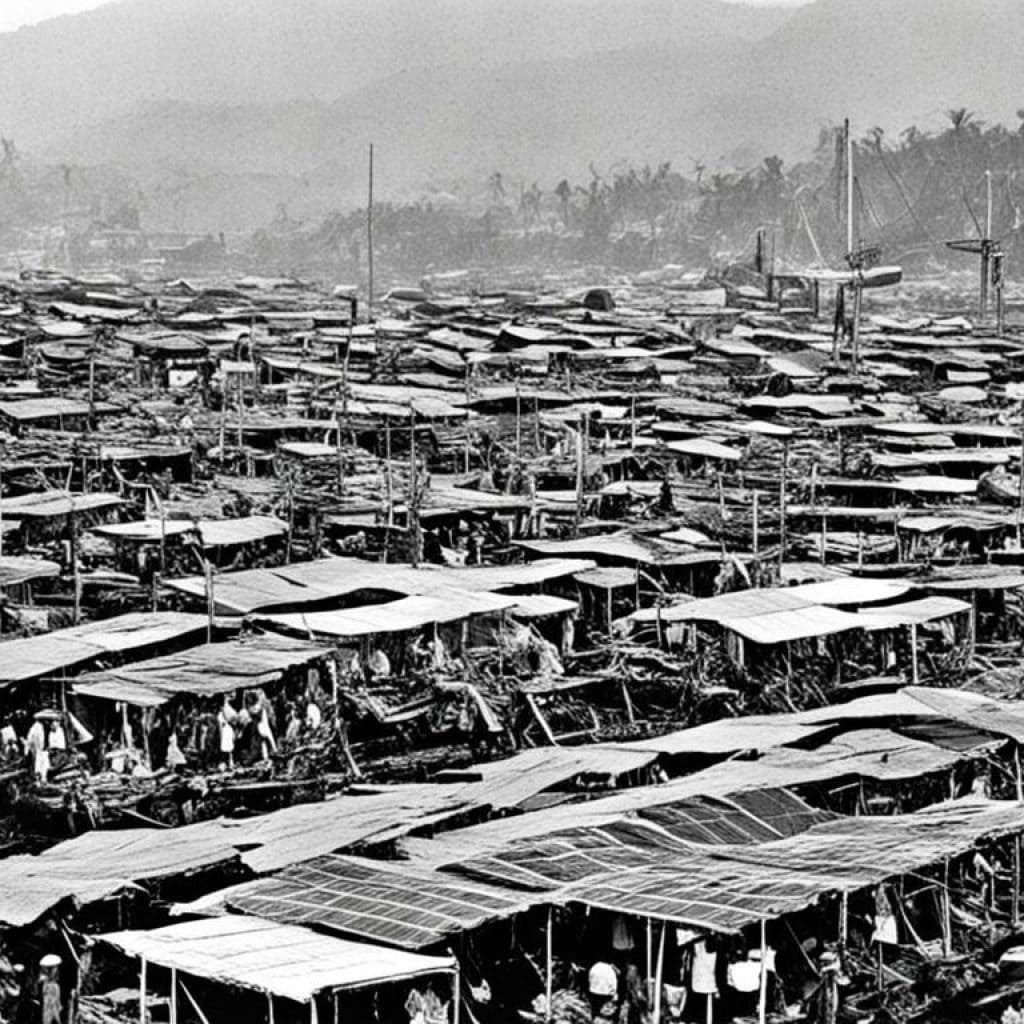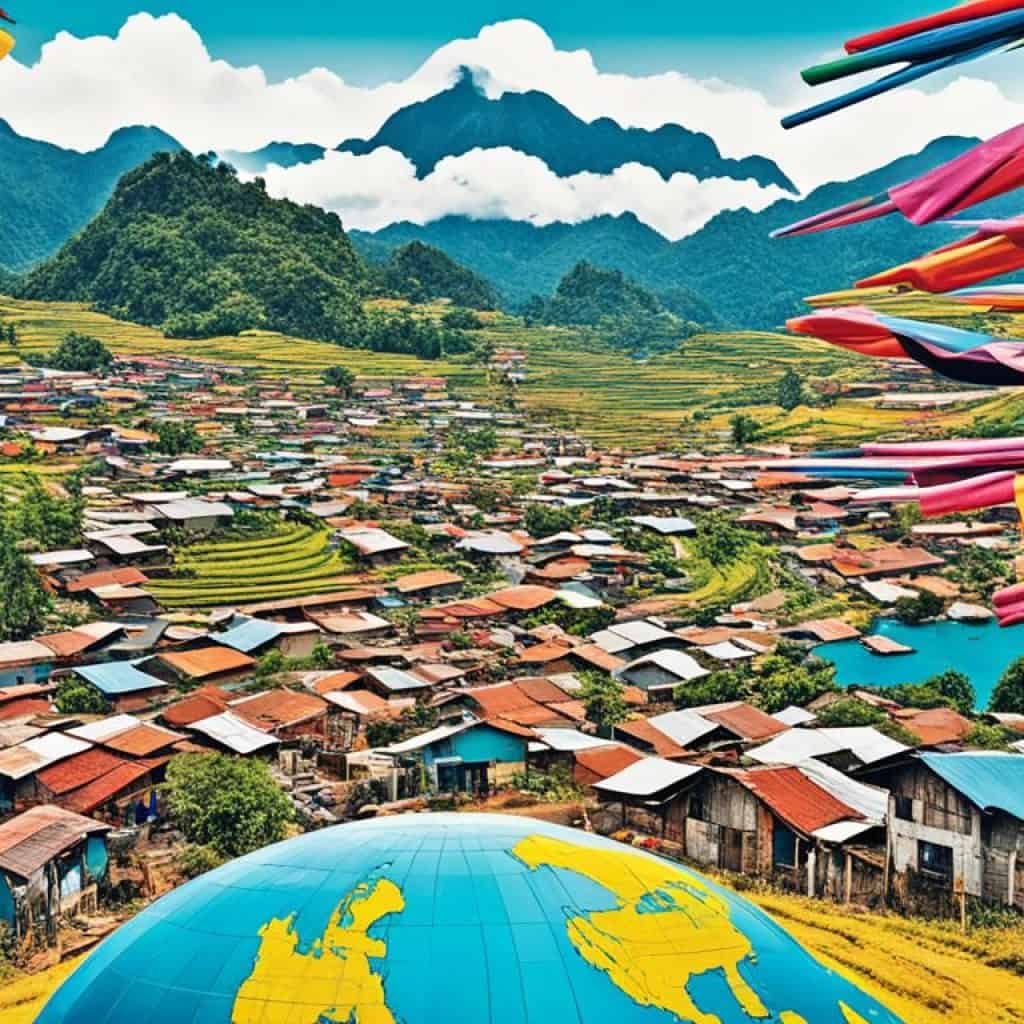Globalization has undoubtedly reshaped the economies, cultures, and societies of countries around the world. But what about its impacts on the Philippines? How has this nation navigated the tide of globalization and what consequences has it brought? As we delve into the effects of globalization in the Philippines, we will uncover a captivating journey of economic growth, cultural exchange, technological advancement, social transformation, and more. So, join us as we unravel the complexities of globalization and its profound influence on the Philippines.
Key Takeaways:
- Globalization has brought both positive and negative impacts on the Philippines, encompassing various aspects such as economics, culture, and social cohesion.
- The Philippines has experienced significant economic growth and employment opportunities due to globalization, but challenges such as inequality persist.
- The country has embraced trade globalization, seeing an increase in foreign investments and global trade relations.
- Technological advancements and labor market changes have played a pivotal role in the effects of globalization.
- Efforts are needed to bridge the gap between winners and losers in the labor market and address the challenges of inequality and the provision of global public goods.
Globalization Trends in the Philippines
As the Philippines continues to embrace globalization, the country has witnessed notable trends in trade openness, finance openness, and economic integration. These trends reflect the nation’s growing integration with the global economy and its efforts to capitalize on the opportunities presented by globalization.
Trade Openness
Trade openness has been a key component of the Philippines’ global engagement strategy. Over the years, the country has made significant progress in improving its trade openness, as evidenced by the increasing share of trade in its GDP. This can be attributed to the Philippines’ commitment to promoting an open trade policy and the development of global value chains in strategic sectors such as electronics and electrical components industry. This sector has played a pivotal role in driving the country’s export growth and enhancing its competitiveness in the global market.
Finance Openness
The Philippines has also experienced moderate financial openness, signaling its growing integration with international financial markets. The country has witnessed an increase in capital flows and the liberalization of its foreign exchange regulatory system. This has boosted investor confidence and attracted both portfolio and direct investments, leading to an expanding exposure to external liabilities. The Philippines’ growing financial openness reflects its strong macroeconomic fundamentals, making it an attractive destination for global investors.
Economic Integration
At the heart of globalization lies economic integration, and the Philippines has been actively engaging in this process. The country’s efforts to integrate with the global economy have resulted in a deeper integration into regional and global supply chains. This has facilitated the development of industries and sectors that are well-positioned to thrive in the global market. The Philippines’ economic integration signifies its commitment to leveraging its strengths and resources to participate fully in the global economy.
As the Philippines embraces globalization, it is important to monitor and adapt to these trends in order to reap the full benefits of economic integration and global opportunities. By fostering trade and finance openness, as well as pursuing effective strategies for economic integration, the Philippines can position itself as a competitive player in the global arena.
| Trend | Description |
|---|---|
| Trade Openness | Increasing share of trade in GDP |
| Finance Openness | Liberalization of foreign exchange regulatory system, attracting capital flows and investments |
| Economic Integration | Deeper integration into regional and global supply chains |
Economic Restructuring
The new wave of globalization has brought about economic restructuring, reshaping global trade patterns and the development of global value chains. The Philippines has experienced changes in its trade dynamics, with a shift towards the export of intermediate goods and the import of capital goods. This has led to the development of global value chains, particularly in industries like electronics and electrical components.
The country has seen improvements in transport and communication technology, which have facilitated trade and allowed companies to manage their production more efficiently. The growth of the IT-BPO industry has also contributed to economic restructuring in the Philippines.
Worsening Inequality
Despite the positive impact of globalization on economic growth and employment, there are concerns about worsening inequality in the Philippines. Income inequality has been on the rise, with certain income groups capturing a larger share of global growth. The drivers of income inequality include technological advancements, changes in labor markets, and unequal access to education and opportunities. These factors have contributed to a widening income gap in the country. Addressing inequality is crucial in ensuring that the benefits of globalization are shared more equitably among the population.
Trends in Inequality
The Philippines has experienced a concerning trend of worsening inequality in recent years. The income gap between the rich and the poor has been widening, leading to a more uneven distribution of wealth. This trend is evident in various sectors of society, from urban areas to rural communities. The poorest segments of the population often face limited access to resources, opportunities, and social services, exacerbating the inequality issue.
| Factors Contributing to Worsening Inequality | Impact |
|---|---|
| Technological Advancements | Rapid advancements in technology have led to job displacement and a growing demand for skilled workers, contributing to income disparity. |
| Changes in Labor Markets | The shift towards a more globalized labor market has created winners and losers, with certain industries experiencing significant growth while others face decline. |
| Unequal Access to Education and Opportunities | Limited access to quality education and opportunities for upward mobility further perpetuate income inequality. |
The drivers of income inequality in the Philippines are complex and multifaceted. A comprehensive approach is needed to address these issues and create a more inclusive society, where the benefits of globalization are shared by all.
“It is our collective responsibility to ensure that no one is left behind in the pursuit of progress. Addressing inequality is not only a moral imperative but also a strategic investment in building a fair and sustainable future.”
As the Philippines continues to navigate the challenges of globalization, it is essential to prioritize policies and initiatives that reduce inequality and promote inclusive growth. By investing in education, skills training, and social safety nets, the country can empower its citizens to thrive in an increasingly interconnected world economy.
Next, we will explore the threats to the provision of global public goods posed by the current state of globalization and the role of international cooperation in overcoming these challenges.
Threats to Provision of Global Public Goods
As globalization continues to shape our interconnected world, there are growing concerns about the provision of global public goods. These goods, such as addressing climate change, reducing poverty, and promoting equality, require international cooperation and collective action. However, various threats pose significant challenges to achieving these goals.
One of the major threats to the provision of global public goods is the rise of protectionism and inward-looking policies in certain countries. As nations become more focused on their own interests, international cooperation becomes strained, hindering efforts to tackle global issues. This poses a significant challenge in addressing problems that require global collaboration and collective solutions.
The global community also faces challenges in addressing pressing issues such as climate change, poverty, and inequality. These complex problems require coordinated global action and cooperation. However, differing priorities, interests, and approaches among nations can hinder progress and dilute efforts to find effective solutions.
Another threat to the provision of global public goods is the declining social cohesion and trust in society. As communities become more fragmented, it becomes increasingly difficult to mobilize collective action and foster the international cooperation needed to address global challenges. Declining social cohesion undermines the trust and cooperation necessary for countries to come together and make meaningful progress.
Efforts to overcome these threats and ensure the provision of global public goods require promoting international cooperation and strengthening collaboration among public and private organizations. It is crucial to foster a sense of shared responsibility and common purpose among nations. By working together, we can overcome the challenges posed by globalization and address pressing global issues in a meaningful and impactful way.

Globalization has brought about various threats to the provision of global public goods, including the rise of protectionism, the challenges of addressing complex global issues, and declining social cohesion. Overcoming these threats requires a renewed commitment to international cooperation and collaboration, as well as efforts to build trust and strengthen social cohesion. By working together, we can ensure the provision of global public goods and create a more sustainable and prosperous world for all.
Cultural Impacts of Globalization in the Philippines
Globalization has had a profound impact on the culture of the Philippines, influencing both the education system and the labor market. One significant cultural impact of globalization is the increased diversity within the higher education institutions in the country. As a result of migration and globalization, there is now a more diverse student population, promoting equity, inclusiveness, and enriching the learning environment.
However, it is crucial to address the instances of discrimination that international students may still encounter. Discrimination can hinder the full realization of the benefits of a diverse student body. As the Philippines continues to embrace globalization, it is important to cultivate an environment of understanding, respect, and acceptance among students from different backgrounds.
Globalization also places a greater emphasis on critical thinking skills within the education system. As the demand for skilled human capital grows, students need to develop critical thinking abilities to navigate the complexities of a globalized world. The ability to critically analyze information and think independently becomes increasingly valuable as the world becomes more interconnected.
Furthermore, the Philippines’ reliance on labor export has had a significant influence on its education system. With a focus on producing globally competitive individuals, the training of students is centered around skills that align with the demands of the international labor market. This includes preparing students for work abroad, where they can contribute to the economic growth of both the Philippines and the countries they migrate to.
To balance the cultural impacts of globalization, the Philippines needs to foster a culture of understanding, sensitivity, and openness to different beliefs and values. This can be achieved through promoting cultural exchange programs, encouraging dialogue, and providing opportunities for students to engage with diverse perspectives.
The Cultural Impacts of Globalization in the Philippines:
| Impact | Description |
|---|---|
| Diversity in Education | The increase in migration has led to a diverse student population in higher education institutions, promoting equity, diversity, and inclusiveness. |
| Discrimination | Instances of discrimination experienced by international students need to be addressed to ensure a more inclusive environment. |
| Critical Thinking Skills | Globalization highlights the need for students to develop critical thinking skills in order to navigate the complexities of a globalized world. |
| Labor Export | The Philippines’ reliance on labor export has influenced its education system and the training of students to become globally competitive. |
By embracing the cultural impacts of globalization while promoting understanding and inclusivity, the Philippines can harness the benefits of a diverse society and prepare its students for success in a globalized world.
Globalization and the Philippine Economy
Globalization has had a significant impact on the Philippine economy. The expanding exports and continuous capital accumulation have been key contributors to the country’s economic growth. The Philippines has witnessed positive effects on employment and industry performance, particularly in sectors associated with global value chains. The integration into global markets has created opportunities for job creation and enhanced productivity in various industries.
One of the driving forces behind the positive impact of globalization on the Philippine economy is the implementation of Free Trade Agreements (FTAs). These agreements have resulted in industry growth and improved labor productivity. However, it is important to note that the network effects of FTA trade shocks have not been statistically significant.
International trade plays a crucial role in shaping the economy of the Philippines. The country’s engagement in global trade has contributed to its overall growth, employment opportunities, and industry performance. By participating in global value chains, the Philippines has been able to tap into international markets and leverage its competitive advantages.
Below is a table highlighting the impact of globalization on the Philippine economy:
| Area | Impact |
|---|---|
| Economic Growth | Expanding exports and continuous capital accumulation contribute to overall economic growth. |
| Employment | Global value chains create job opportunities in sectors associated with international trade. |
| Industry Performance | The integration into global value chains has improved productivity and competitiveness in various industries. |
Overall, globalization has played a significant role in shaping the Philippine economy. The country’s participation in global trade has resulted in economic growth, employment opportunities, and enhanced industry performance. However, policymakers and stakeholders must continue to address the challenges and potential risks associated with globalization to ensure sustainable and inclusive development.

Globalization and the Education System in the Philippines
Globalization has had a significant impact on the education system in the Philippines. The country recognizes the need for internationalization in education to foster global competencies and enhance competitiveness.
However, there are challenges and obstacles that need to be addressed. Inadequate e-library and ICT services, institutional challenges, and faculty motivation towards advanced education are some of the issues that hinder the effective integration of global perspectives in the curriculum.
The integration of international and global dimensions into the curriculum, faculty composition, research, and global linkages is crucial for the internationalization of education in the Philippines. By embracing the diverse perspectives and knowledge from around the world, students can develop the necessary skills and understanding to thrive in a globalized society.
“Education is the passport to the future, for tomorrow belongs to those who prepare for it today.” – Malcolm X
To address the challenges posed by globalization, the Philippines must invest in the development of modern e-library and ICT infrastructure to facilitate access to global knowledge resources. Additionally, institutions should prioritize faculty development programs that promote continuous learning and research collaborations with international partners.
The integration of international components and global perspectives into the curriculum should be an ongoing process. This can be achieved by incorporating cross-cultural learning experiences, promoting critical thinking skills, and fostering a global mindset among students.
Faculty Composition and Global Expertise
Creating a faculty composition that reflects global expertise is essential for a truly internationalized education system. By recruiting faculty members with diverse cultural backgrounds and experiences, institutions can provide students with a broader understanding of global issues and perspectives. Furthermore, faculty members with international experience can serve as role models, inspiring students to pursue global opportunities and expand their horizons.
Enhancing Global Linkages
Establishing global linkages with educational institutions and organizations worldwide is crucial for the internationalization of education in the Philippines. Collaborative research projects, student exchange programs, and joint academic initiatives create opportunities for knowledge sharing, cultural exchange, and the development of global competencies.
| Benefits of Global Linkages |
|---|
| 1. Exchange of knowledge and best practices |
| 2. Exposure to diverse cultures and perspectives |
| 3. Increased research collaboration |
| 4. Opportunities for student mobility and studying abroad |
“Education is not preparation for life; education is life itself.” – John Dewey
By actively engaging with global partners, the Philippine education system can create a vibrant and inclusive learning environment that prepares students to navigate the challenges and opportunities of a globalized world.
Globalization and Social Cohesion in the Philippines
Globalization has had far-reaching implications for social cohesion in the Philippines. One of its notable effects has been the increase in migration, which has resulted in a more diverse society, fostering equity and inclusiveness. The Philippines, known for its warm hospitality, has been successful in embracing cultural diversity.
However, there are challenges that need to be addressed to ensure and strengthen social cohesion and trust among its population. One significant concern is job security, as globalization brings changes to industries and labor markets. The inherent uncertainties in a rapidly changing global economy can cause anxiety and erode trust between employers and employees.
Another challenge is the potential commodification of local culture in the tourism industry. While globalization has provided opportunities for tourism growth, it is essential to strike a balance between showcasing the country’s heritage and preserving its authenticity. The Philippines should maintain cultural integrity while capitalizing on the economic benefits that tourism brings.
The key to building trust and social cohesion lies in promoting understanding, respect, and inclusiveness among the population. This can be achieved through dialogue, education, and community engagement. By encouraging intercultural interactions and providing platforms for open discussions, the Philippines can foster greater cohesion within its society.

Fostering Social Cohesion:
- Promote cultural education and awareness programs within schools and communities.
- Encourage intercultural dialogue and understanding through community events and initiatives.
- Invest in programs that enhance job security and provide opportunities for upskilling and retraining.
- Develop sustainable tourism practices that respect and preserve local culture and traditions.
- Support community-led initiatives that promote social inclusiveness and equality.
By prioritizing these steps, the Philippines can navigate the challenges of globalization while preserving its social fabric. Embracing the benefits of globalization while safeguarding social cohesion will ensure a more inclusive and harmonious society for all.
Policy Recommendations for Navigating Globalization in the Philippines
Navigating the challenges of globalization in the Philippines requires a comprehensive approach. In order to address economic restructuring and promote inclusive growth, policymakers and stakeholders should consider the following policy recommendations:
- Promoting Inclusive Growth: Efforts should be made to ensure that the benefits of globalization are shared more equitably among all segments of society. This can be achieved by implementing policies that provide equal access to education, healthcare, and opportunities for economic advancement.
- Reducing Inequality: Measures should be taken to reduce income inequality and bridge the gap between different income groups. This can be accomplished through progressive taxation, social welfare programs, and policies that promote equal access to quality education and employment opportunities.
- Addressing Global Public Goods: Strengthening cooperation at the global level is crucial for addressing global issues and providing public goods that benefit all nations. The Philippines should actively participate in international efforts to combat climate change, poverty, and other pressing challenges.
- Fostering Social Cohesion: Building trust and social cohesion within the country is essential for creating an inclusive and resilient society. This can be achieved by promoting understanding, respect, and inclusiveness among different cultural, ethnic, and socio-economic groups.
By implementing these policy recommendations, the Philippines can navigate the challenges of globalization and create a more equitable and prosperous future for all its citizens.
Conclusion
Globalization has had a profound impact on the Philippines, touching various aspects of its economy, education system, culture, and social fabric. The effects of globalization have been mixed, presenting opportunities for growth and development, while also posing challenges and concerns.
The Philippines has experienced positive economic growth and employment as a result of globalization. The country has embraced trade openness and seen an increase in foreign investments, fostering economic integration and global trade relations. However, there are concerns about increasing inequality and the uneven distribution of benefits. Policymakers should focus on inclusive policies that ensure the benefits of globalization are shared equitably among all segments of society.
Addressing the challenges brought on by globalization requires a proactive response from the Philippines. The country should prioritize the development of inclusive policies that promote social cohesion and trust. Additionally, international cooperation is crucial for addressing global issues and providing global public goods. By navigating the new wave of globalization with inclusivity and cooperation in mind, the Philippines can harness its potential and thrive in a rapidly changing world.
In conclusion, the Philippines’ response to the effects of globalization should involve adopting inclusive policies, promoting international cooperation, and fostering social cohesion. By doing so, the country can minimize the challenges posed by globalization and maximize its opportunities for growth, development, and a brighter future.


















Add comment